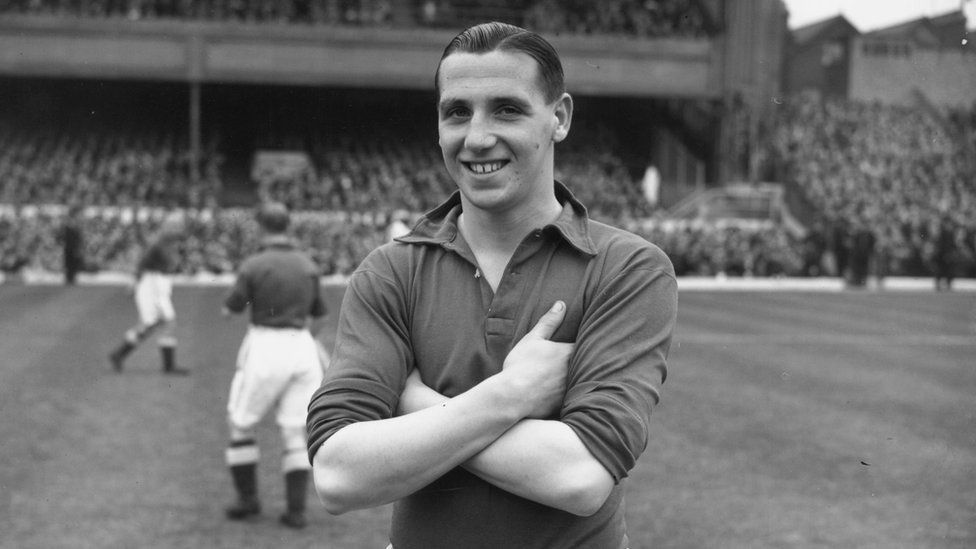Tommy Lawton (6 October 1919-6 November 1996) ranks among the most gifted players England has ever produced. A centre-forward, he was considered a master in the air, and strong in every aspect of the game. At the same time his frequent transfers reflected not only his ability as a footballer but also his talent for falling out with his employers. Lawton signed amateur forms for Burnley were he soon became the star attraction. In January 1937 Burnley accepted £5400 from Everton for his transfer. When he joined Everton he had been greeted by team mate Joe Mercer with the comment: "Aye, son, you're a big un." Lawton replied: "Aye, and a good `un." A powerful header of the ball, and a good passer (despite wearing arch supports in his boots because of his flat feet), he was the leading goal scorer in the first division in the 1937–8 season with twenty-eight goals and the following season, 1938–9, his thirty-five goals were crucial in the winning of the league championship. Like many other players of his generation, his career was interrupted by the Second World War. In 1938 Lawton was selected for England while still in his teens, and in 1939 he headed the winning goal in a famous victory over Scotland. He played a lot of wartime football, including twenty-three games for England. After being demobilized in 1945 Lawton moved again, after arranging his own transfer from Everton to Chelsea for £11,500. He liked London but stayed for only one full season, even though his twenty-six goals that season was a club record. Instead Lawton surprised the football world by joining Notts County in 1947 for a fee of £20,000, a new British record. As part of the deal, Chelsea also secured the services of the young Notts County wing-half Bill Dickson. They were an unexceptional team which for several years before the war had been embedded in the middle of the southern section of the third division of the league. However, the club had potential, and Lawton began to realize some of it. Crowds rose from an average of 9,000 to 35,000, and in 1949–50 the championship was won and with it promotion to the second division. In the meantime Lawton had become the first post-war player from the third division to be selected for England, for whom he appeared three times in 1948. But he was never picked again, even though he was only twenty-nine and had scored 22 goals in his 23 England appearances. In 1952 he moved to second-division Brentford, where he became player–manager for a short time. Surprisingly, at thirty-four, he was bought by Arsenal in September 1953. Although he failed to score until March and was not a regular member of the first team, he did act as a catalyst in the improvement of the team. In 1956 he left Highbury to become player–manager of Kettering Town leading them to the southern league championship in 1956–7. There following an unsuccessful period as manager of Notts County. Like many players of his generation, Lawton fell on hard times after football, unemployed after failing in football management. "I would leave home of a morning pretending I had a job just like any other working man and I would sit all day in the market square or the library till it was time to go home again. More than once it crossed my mind to walk into the Trent, to end it all." He survived a severe stroke in 1970 and had to sell all his medals and caps despite late testimonials from Brentford and Everton.
Tommy Lawton

